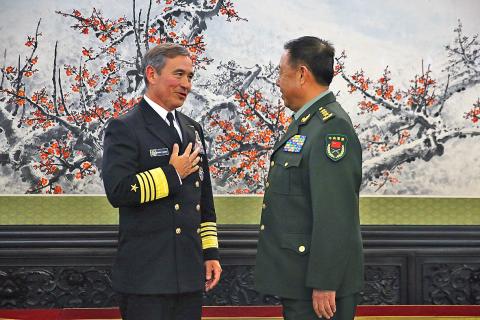The US military will continue to operate wherever international law allows, a top US admiral said in Beijing yesterday, a week after Washington infuriated Beijing by sailing close to artificial islands it is building in the South China Sea.
“International seas and airspace belong to everyone and are not the dominion of any single nation,” US Admiral Harry Harris said at the Stanford Center at Peking University.
“Our military will continue to fly, sail, and operate whenever and wherever international law allows. The South China Sea is not — and will not — be an exception,” he said, according to a transcript.

Photo: AP
Harris is the head of the US Pacific Command and his public declaration in the Chinese capital is a mark of US resolve over the waterway, where Beijing has built up rocks and reefs into artificial islands with facilities for military use.
Last week, the US gave a practical demonstration of its policy, sailing the USS Lassen guided missile destroyer within 12 nautical miles (22.2km) of at least one of the land formations China claims in the disputed Spratly Islands (Nansha Islands, 南沙群島).
Chinese officials rebuked Harris over the action, with People’s Liberation Army Chief of General Staff Fang Fenghui (房峰輝) telling him it had “created a disharmonious atmosphere for our meeting and this is very regretful.”
Washington says it takes no position on sovereignty disputes in the region and the sail-by was intended to protect freedom of navigation under international law.
The USS Lassen’s mission was part of the US’s “routine freedom of navigation operations,” Harris said in his speech, intended to “prevent the decomposition of international laws and norms.”
The “ambiguous maritime claims” represented by China’s “so-called nine-dash line” pose a challenge to navigation, Harris said.
Taiwan, the Philippines, Vietnam, Malaysia and Brunei also have overlapping claims in the sea.
Harris made some conciliatory remarks, praising US-China ties and pointing out that Chinese and US ships were visiting ports in each other’s countries.
“Some pundits predict a coming clash between our nations. I do not ascribe to this pessimistic view,” he said.
Separately, a US defense official on Monday said that the US Navy plans to conduct patrols within 12 nautical miles of the islands about twice a quarter to remind China and other countries about US rights under international law.
“That’s the right amount to make it regular, but not a constant poke in the eye,” the official said.
Additional reporting by Reuters

SEPARATE: The MAC rebutted Beijing’s claim that Taiwan is China’s province, asserting that UN Resolution 2758 neither mentions Taiwan nor grants the PRC authority over it The “status quo” of democratic Taiwan and autocratic China not belonging to each other has long been recognized by the international community, the Mainland Affairs Council (MAC) said yesterday in its rebuttal of Beijing’s claim that Taiwan can only be represented in the UN as “Taiwan, Province of China.” Chinese Minister of Foreign Affairs Wang Yi (王毅) yesterday at a news conference of the third session at the 14th National People’s Congress said that Taiwan can only be referred to as “Taiwan, Province of China” at the UN. Taiwan is an inseparable part of Chinese territory, which is not only history but

CROSSED A LINE: While entertainers working in China have made pro-China statements before, this time it seriously affected the nation’s security and interests, a source said The Mainland Affairs Council (MAC) late on Saturday night condemned the comments of Taiwanese entertainers who reposted Chinese statements denigrating Taiwan’s sovereignty. The nation’s cross-strait affairs authority issued the statement after several Taiwanese entertainers, including Patty Hou (侯佩岑), Ouyang Nana (歐陽娜娜) and Michelle Chen (陳妍希), on Friday and Saturday shared on their respective Sina Weibo (微博) accounts a post by state broadcaster China Central Television. The post showed an image of a map of Taiwan along with the five stars of the Chinese flag, and the message: “Taiwan is never a country. It never was and never will be.” The post followed remarks

NATIONAL SECURITY: The Chinese influencer shared multiple videos on social media in which she claimed Taiwan is a part of China and supported its annexation Freedom of speech does not allow comments by Chinese residents in Taiwan that compromise national security or social stability, the nation’s top officials said yesterday, after the National Immigration Agency (NIA) revoked the residency permit of a Chinese influencer who published videos advocating China annexing Taiwan by force. Taiwan welcomes all foreigners to settle here and make families so long as they “love the land and people of Taiwan,” Premier Cho Jung-tai (卓榮泰) told lawmakers during a plenary session at the Legislative Yuan in Taipei. The public power of the government must be asserted when necessary and the Ministry of

Proposed amendments would forbid the use of all personal electronic devices during school hours in high schools and below, starting from the next school year in August, the Ministry of Education said on Monday. The Regulations on the Use of Mobile Devices at Educational Facilities up to High Schools (高級中等以下學校校園行動載具使用原則) state that mobile devices — defined as mobile phones, laptops, tablets, smartwatches or other wearables — should be turned off at school. The changes would stipulate that use of such devices during class is forbidden, and the devices should be handed to a teacher or the school for safekeeping. The amendments also say